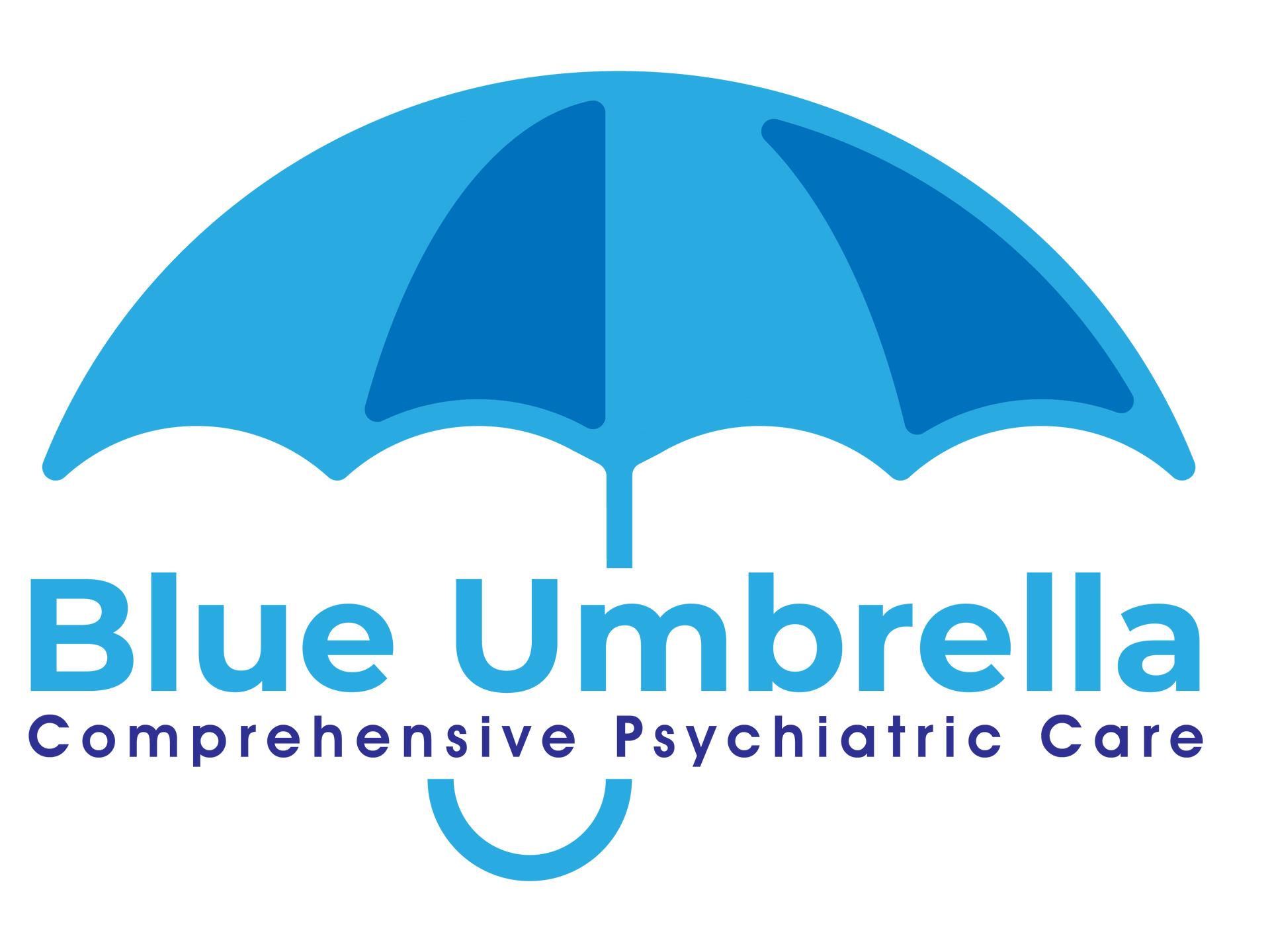Obsessive Compulsive Disorder
examples of
OCD
Some common examples of OCD obsessions include:
- Fear of germs or contamination
- Doubt about whether you've locked the door, turned off the stove, or completed a task
- Fear of harming yourself or others
- Need for symmetry, order, or exactness
- Intrusive sexual or violent thoughts
The compulsions that result from these obsessions may include:
- Excessive hand washing, cleaning, or sanitizing
- Checking and rechecking things like locks or appliances
- Counting or repeating certain phrases or prayers
- Arranging and rearranging objects until they are "just right"
- Mental rituals such as counting, checking, or praying
The Blue Umbrella Psychiatry Program
Your initial evaluation begins with a thorough assessment. We’ll learn about your current symptoms and lifestyle and your personal and family medical history. We’ll discuss what efforts you’ve already tried, from medications to alternative medical approaches toward resolving your symptoms. If a diagnosis of depression is made, we’ll discuss evidence-based treatment options with you. We’ll work together to customize a treatment plan to relieve your symptoms and restore your quality of life. If necessary, you’ll be prescribed medication to regulate your brain chemistry and your mood. As your depression symptoms subside, you have more mental clarity and space to focus on exploring and resolving any underlying issues that contribute to your depression in therapy.
medication management
While not all patients will be prescribed medication, today's psychiatric medications have been a key piece to most of our patients' health improvements. Our medical team will work individually with you to create a treatment plan for your situation, with a goal to help achieve a successful improvement to mental health challenges and an optimal lifestyle. Ideal medication management requires an accurate diagnosis, beginning with a Blue Umbrella Psychiatry comprehensive assessment.
Once you've been prescribed medication we'll work with you to monitor for effectiveness, as well as side effects making adjustments to your treatment as necessary. Some medications take weeks to witness an impact, as with antidepressants, while those that are used to treat anxiety may begin to have an effect after only hours.
Importantly, medication management is just one piece of the puzzle. Complementary therapy sessions with your Blue Umbrella therapist - or your own therapist - will optimize your mental health and your ability to enjoy your life.
Should medication prove to not be effective, we can offer patients both Transcranial Magnetic Stimulation (TMS) and Esketamine treatments.
transcranial magnetic stimulation
(TMS)
TMS is an FDA-approved treatment that uses magnetic pulses to stimulate the root of depression in the brain. It is safe, highly effective and covered by most insurance. Click to learn more about the benefits of TMS or schedule an evaluation to see if it’s right for you.
THERAPY
Individual Therapy
Individual therapy, also known as psychotherapy or counseling, is a crucial and effective form of mental health support that focuses on the needs of a single individual. It offers a safe and confidential space where a person can work closely with a trained therapist or counselor to explore their thoughts, emotions, behaviors, and challenges. The importance of individual therapy lies in several key aspects, including:
- Personalized Attention
- Confidentiality
- Targeted Problem-solving
- Emotional Support
- Self-Discovery and Insight
- Building Coping Skills
- Resolving Trauma
- Enhancing Relationships
- Mental Health Maintenance
- Empowerment and Growth
In order for sustained and profound change to occur, you must work with the psychological, social and cultural aspects of life as well. We offer collaborative and evidence-based care for children, adolescents and adults to create a meaningful life.
family therapy
Each of our therapists is trained in facilitating family therapy sessions. Goals include improving communication, developing and maintaining healthy boundaries and promoting problem solving behaviors. Each family has its own unique family dynamics and our team will help you to understand current dynamics and move toward an optimal cohesion for improved day to day life and a brighter outlook for the future for each family member, especially for those with mental illness. The main focus is on understanding the family dynamics and communication patterns to improve overall functioning and well-being. The benefits of family therapy include:
- Improved Communication
- Strengthened Relationships
- Enhanced Problem-Solving Skills
- Family Bonding
- Resolving Family Conflicts
- Improved Coping Strategies
- Addressing Family Changes
- Understanding Family Patterns
- Support for Specific Issues
- Inclusive Approach
- Prevention of Relapse
Overall, family therapy offers a comprehensive and systemic approach to understanding and addressing family challenges. By improving communication, resolving conflicts, and fostering a supportive environment, family therapy can lead to positive and lasting changes that benefit all family members.
group therapy
You are not alone in your struggles. Blue Umbrella Psychiatry has multiple group therapy programs to allow you to build relationships, find common ground and experiment with new ways of living life.
Group therapy is a valuable and effective form of therapeutic intervention that involves a small group of individuals working together under the guidance of a trained therapist or counselor. The importance of group therapy lies in its unique benefits and outcomes, which complement and sometimes surpass those of individual therapy. Here are some key aspects of its significance:
- Shared Support and Understanding
- Normalization of Experiences
- Feedback and Perspective
- Social Skills Development
- Empowerment and Encouragement
- Cost-Effectiveness
- Diversity and Inclusivity
- Real-life Simulation
- Generalization of Skills
- Long-lasting Support Network
Overall, group therapy offers a dynamic and enriching experience that complements individual therapy and can lead to significant personal growth and positive change. The combination of shared support, diverse perspectives, and the opportunity for social skills development makes group therapy a valuable and impactful approach to promoting mental health and well-being.



